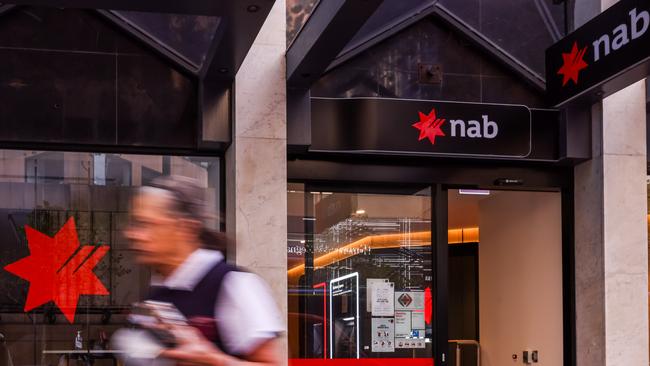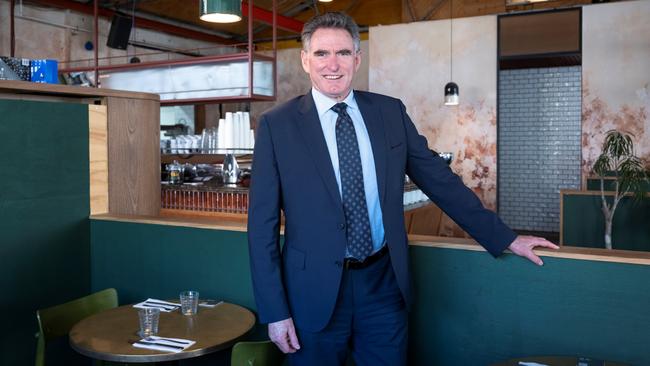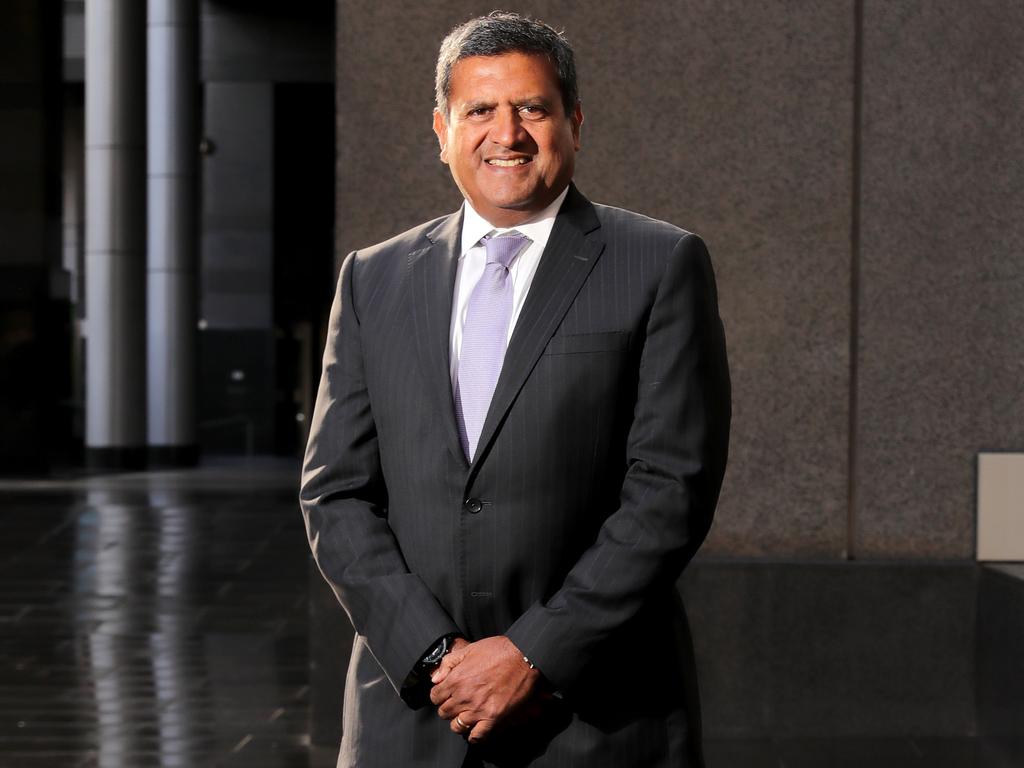The Australian’s 2022 CEO Survey: National Australia Bank’s Ross McEwan
Cybercrime is one of the biggest threats facing Australia, says NAB chief executive Ross McEwan, and the country will need a cohesive, national approach to combat it.

In his responses to The Australian’s CEO survey, NAB chief executive Ross McEwan sets out the challenges that face his organisation, his customers and Australia as a nation.
How are inflation and interest rates affecting your business and customers? Does it change your approach to capital management?
We expect growth in home lending next year, but there are early signs that interest rate changes are starting to have an impact.
Customers who have small buffers in their home loans or have high loan-to-value ratios are likely to be most affected as they also experience higher cost of living pressures. We have been contacting a number of these customers proactively and at this stage their response has been “look, we’re okay at the moment, thank you for the call”. So, they’re quite resilient.
As many people refinance to find a better rate as interest rates rise and as customers roll off low fixed rates, we are seeing the home lending market dynamics change. Competition remains intense and this, coupled with increased funding costs, is impacting margins.
We’ll be competitive on home loans and this is an important part of our business. We’ve also got good options for where to put excess balance sheet over the next couple of years. Our business bank is performing well and gaining market share. Despite business confidence softening, business conditions are still pretty strong, and our business customers are benefiting from that.
Where do you see risk now for Australian business – eg energy, supply chain, cyber? What does the country need to do to attract investment?
Cybercrime is one of the greatest threats facing businesses, customers and the country more broadly. We need to be vigilant, not just as individual businesses but as a nation, to keep people safe from cyber criminals.
This is a “Team Australia” moment. Just as we came together to tackle the pandemic, the major banks, telcos, other big business and the government can work together to develop a more cohesive national approach to this issue.
NAB alone is confronted by around 50 million attacks on our digital channels per month. Multiply this across the country and you can see the size of the problem. This is why we’re hiring more people and investing more money in financial crime detection and prevention and cybersecurity capability.
When it comes to how Australian businesses have fared, they’ve had a very good year overall despite some setbacks. For small and medium businesses generally, labour shortages are still a major problem. Around 40 per cent of our business customers tell us the labour shortage impact is very significant, with around one in three Victorian businesses saying it was very significant in the last three months. We need to address this problem with more migration, faster and easier visa processing, better training and the creativity to tap into different labour pools. And we need to tell the world we are open, there are plenty of jobs and opportunities here in Australia. There’s no other place in the world I’d rather be at the moment.
How is energy transition affecting you? What needs to happen here?
We have an enormous opportunity to advance our economy through the climate transition to net zero. A report undertaken for the Business Council of Australia last year found that Australia’s economy could gain around $890bn over the next 50 years if we act early and get it right.
Inaction will continue to take a toll we can’t ignore. Natural disasters exacerbated by climate change not only take a human toll but a huge financial one too.
Given how complex the transition is, one thing we can do to help is bring in consistent and standardised reporting of emissions. We’re all in a better position to tackle the problem when we have a clear playing field.

Around 90 per cent of today’s emissions in Australia come from energy, mobility (transport), raw material manufacturing and food and land use. The transition of our economy comes down to helping these sectors drastically lower their emissions.
Progress is underway but the key role NAB can play is to continue to provide financial backing to support customers and communities to help them do this. The environmental and economic opportunity is huge if we get this right.
Productivity growth is pitched at a low 1.2 per cent. What needs to happen to lift productivity? What should a reform agenda prioritise?
When NAB surveyed businesses a couple of years ago, many small businesses told us they can spend 12 hours every week on government administration. Regulation is important but if we can give small businesses some time back it will enable them to grow their business, create more jobs or simply spend time with their family and improve their wellbeing.
One area we could make an immediate difference in is the employment and pay system, which is far too complex and time consuming. A small business like an independent supermarket may be paying staff a total of 126 different rates of pay. It’s just too easy to get wrong.
We also need more modern education curriculums to overcome the challenge of having too few people who can fill vacancies, particularly in technology roles.
At NAB, we want to build careers, not just jobs, which is why we’re training people in the digital and data skills needed today and in the future. We have already trained more than 2700 colleagues as accredited cloud experts over the past two years, with more to come. We are also raising the bar of professionalism in the banking industry, with more than 8000 colleagues achieving the Professional Banking Fundamentals qualification through the Career Qualified in Banking program. In an Australian industry first, NAB intends to enrol all permanent colleagues into this formal accreditation by 2026.
Businesses can only do so much though and it’s important that we have the right education settings to ensure Australia can stay globally competitive when it comes to training local talent.
Will the government’s changes on childcare and paid parental leave move the dial on workforce participation and productivity?
Equal opportunity for women is not only critical for equality generally but is also essential for economic growth. NAB’s proposed enterprise agreement seeks to transform paid parental leave into a shared responsibility between men and women. Encouraging more men to take parental leave is essential to achieving this and that means providing all parents with the same access to parenting leave entitlements, including primary, secondary, adoption, foster and kinship carers.
We also support government policies to subsidise and improve access to childcare, because cheaper childcare removes financial disincentives to return to work, and it is typically mothers whose careers are held back by this.
Read more: The Australian’s CEO Survey 2022
Has your business adapted to labour shortages? Do you see IR changes, including industry-wide bargaining, as progress? Has your thinking on working from home changed in 12 months?
Labour shortages are an issue facing all industries across Australia. Businesses just can’t get people for them to work, and it’s really inhibiting their growth.
Many New Zealand and Australian businesses are struggling to find workers. This is a flow-on effect of shutting ourselves off to the world for nearly two years by closing our borders. Australia has agreed to increase the immigration cap from 160,000 to 195,000 over the next 12 months to help. We need to be loud and clear that we are open and encourage people back into the country.
NAB has 35,000 colleagues and about 600 vacancies at the moment, mostly in technology roles but we have vacancies across all areas of the bank.
As a result we have had to look offshore for talent. We have established Global Innovation Centres in India and Vietnam to bolster our technology workforce, primarily due to the technology, digital and data talent shortage in Australia.
We are a relationship bank, so my view is that most roles at NAB require regular face-to-face connection. This means a mix of two to three days a week from the office and two to three days from home. For many roles it means being in the office or with customers more than that. Having a hybrid approach gives colleagues more flexibility to work and meet commitments at home as well as attending the office for vital connection and collaboration.







To join the conversation, please log in. Don't have an account? Register
Join the conversation, you are commenting as Logout